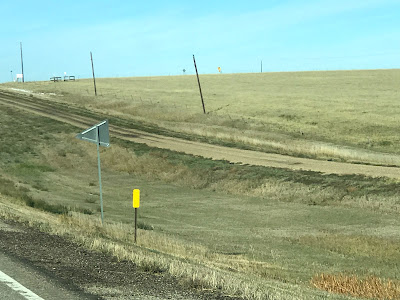It seems, over the years, and close to a million miles
driven, that I usually end up in a part of the world devoid of trees.
Although one of my favorite places is the Great Northwoods, I seem to gravitate
to the plains. The Beast and I will tote the dogs west until the pines
are supplanted by deciduous forests, then tall and short grass prairies,
finally, the sage and mesquite take over. Along the way, we cross the Big Muddy
and the Old Man River, and numerous smaller watercourses. They were
incredible barriers to expansion. We blast over them now at over a mile a
minute, without so much as a passing thought to the men and women with brains
and money enough to span a mile of river with a bridge for trains, then cars.
Hunting native prairie grouse (Sharptails, Prairie
Chickens, Sage Grouse), and non-native game-birds (Hungarian Partridge,
Pheasant, Chukar) in the blue sky, open country of the west is worth the
drive. The Dakotas are a gentleman's compromise for a bird hunter.
They are a little less tame than Kansas and Oklahoma, and much more refined
than wild Montana or Wyoming. When asked about traveling to hunt, and
destinations, I will normally suggest Kansas. To my mind, it is the safe
start to life-long adventure following bird dogs. There is not too much
in the way of danger to the dog, lots of public land, and lots of birds (in a
good year). But, one may outgrow the training wheels after a few years,
and look towards some greater adventure with their hard-working dogs. The
Dakotas, Montana, Wyoming, and Idaho beckon. It's time to expand that comfort
zone. With greater risk is much greater reward.
Hunting the prairie, sometimes, boils down to the
basics. Coffee, driving, putting out, and
picking up. When the day is done, and the thoughts turn to feeding, cleaning,
fueling, warming, and, finally, sleeping, it usually involves a long, tiring
drive back to the motel or camper. Back down the two-track, then the
widened gravel road (past isolated ranch houses and old shut down missile silos),
as we look for the pavement and, finally, a smooth ride. The next day will
be the same with the biggest decision where to put out, and which dog to run.
Through the years, I've noticed the ubiquitous power
poles. Perhaps due to a friend who recently took a job running a rural
electrical company on the plains, I seem to look a little more at the poles and
the towers. I've discovered an interesting fact. My best days on the
prairie have been where the power poles lean. Not the big, steel towers that
carry a gazillion volts straight line across terrain that would give a Mountain
Goat pause. No, the short, little poles planted back in the day, with the
cross bar located near the top, and glass insulators, usually 6 or so, spaced
across the bar. I suppose they brought electrical power to the remote
parts of the country around the middle of the last century. At the time, I
imagine they were a technological advancement on a par with the airplane. Yep, those poles. 30, 40, or 60 years of constant wind will push those poles out
of the vertical. Sometimes, all the way to the ground.


That constant wind, to me, is synonymous with the
outstanding bird hunting for the prairie birds. More and more, I see the
remnants of long runs of old poles, leaning with the wind. Fighting hard
and winning a few battles, but losing the war. They, like the Old Roads, are
reminders of a bygone era. But, they mark the land I love to hunt.
Rarely, do I not see them, now that I look. It's not that all leaning
poles mark good hunting. it's that all good hunting is marked by
leaning poles. When the time comes, I think I'd like my ashes to be spread where I was one with the wind, dogs, birds, sun, snow, and rain- in the country where the power poles lean.

